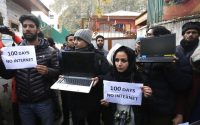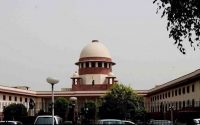Won’t review death for December 16 rapist, rules Supreme Court.
Source – hindustantimes.com
The Supreme Court on Wednesday confirmed the death penalty awarded to one of the four people convicted of the rape and murder of a 23-year-old paramedical student in the national capital seven years ago, turning down his plea for a review of its 2017 judgment that upheld the capital punishment.
The ruling on the plea by Akshay Kumar Singh (33) meant that the review petitions of all four death row convicts stood dismissed in the top court. The convicts can still file curative petitions, which are considered the last legal recourse in the court and are generally heard in-chamber.
“The review petition is not for rehearing of the appeal on re-appreciation of the evidence over and over again. A party is not entitled to seek review of the judgment merely for the purpose of rehearing of the appeal and a fresh decision,” a three-judge bench said.
The bench, headed by justice R Banumathi and also comprising justices Ashok Bhushan and AS Bopanna, said there was no “error apparent on the face of the record”, and none of the grounds raised by Singh call for review of the 2017 judgment that upheld the death penalty to the four accused.
Singh, Mukesh Kumar (33), Pawan Gupta (25) and Vinay Sharma (27) were convicted for brutally assaulting and gang-raping the young woman in a moving bus on December 16, 2012, in New Delhi, before throwing her out of the vehicle. The crime triggered nationwide outrage, put the spotlight on the issue of women’s safety, and led to stricter anti-rape laws. The woman died about two weeks later at a hospital in Singapore.
The fifth accused in the case, Ram Singh (35), allegedly committed suicide in Delhi’s Tihar Jail in 2013. An underage person, who was convicted by a juvenile justice board in 2015, was released from a correctional home after serving a three-year term. In September 2013, a fast-track court awarded death penalty to Singh, Kumar, Gupta and Sharma. It was upheld by the high court in March 2014 and by the Supreme Court in May 2017. On July 9, 2018, the top court dismissed the review pleas filed by Kumar, Gupta and Sharma, saying no grounds had been made out by them for the review.
Hours after the Supreme Court ruling on Wednesday, a court in Delhi directed authorities of Tihar Jail, where the convicts are housed, to seek a response within a week from the four men as to whether they would file mercy pleas requesting the President to stay their execution.
Additional sessions judge Satish Kumar Arora commenced the hearing on a Delhi government plea seeking issuance of death warrants of the convicts after the top court ruling, and said he will wait for the copy of the judgment. The Patiala House court then adjourned the hearing for January 7.
The woman’s mother welcomed the Supreme Court decision to dismiss Singh’s plea, but broke down after the Patiala House court adjourned the hearing on the issuance of death warrants. Consoling her, the judge said, “I have full sympathy with you…We are here to listen to you but are also bound by the law.”
The mother told reporters outside the court, “We have been fighting for seven years and the court has not considered our rights when giving this decision. There is no guarantee that a final judgment will be delivered on the next hearing as well.”
The woman’s father said the family will not be satisfied till a death warrant is issued by the Patiala House court. “We have had a painful journey. The SC has rejected the review plea but we will not be happy till the time the Patiala House court issues death warrant. The entire country wants justice for her,” he said.
Later in the day, the Tihar Jail administration issued a notice to the convicts to file mercy petitions within seven days, director general (prison) Sandeep Goel said, according to news agency PTI. In the Supreme Court, the three-judge bench said the grounds raised by Singh were “almost repetition of the arguments” raised in the earlier review pleas filed by other convicts and these issues cannot be “raised repeatedly”.
On the other grounds raised by Singh’s counsel, AP Singh, including alleged flaws in the probe and manipulation of evidence, the bench said these aspects had already been dealt with and rejected by it in the 2017 judgment.
AP Singh also argued that a book titled ‘Black Warrant’, written by former law officer of Tihar jail Sunil Gupta and HT journalist Sunetra Choudhury, said Ram Singh, who allegedly committed suicide in the jail, may have been “murdered” in prison. “Here again, the opinion of the said former law officer Sunil Gupta is only his opinion, which is not supported by any material,” the bench said.
It also dealt with allegations that the sole eye witness, present in the bus along with the woman, had taken “heavy amount as bribe” for giving statements in the media when the trial was on at a district court in Saket. “In a criminal case, culpability or otherwise of the accused are based upon appreciation of evidence adduced by the prosecution and also the evidence adduced by the defence,” it said.
Solicitor general (SG) Tushar Mehta, appearing for the Delhi government, told the bench that there are some crimes for which the “humanity cries” and “god also must have held his head in shame” for “not being able to save the innocent girl” and for having created these “monsters”.
After the verdict was pronounced, Singh’s counsel sought three weeks to file a mercy petition before the President. SG Mehta said one week is prescribed under the law for filing the mercy petition.
National Commission for Women chief Rekha Sharma welcomed the Supreme Court’s rejection of Singh’s review petition, but said the delay in hanging the culprits is “painful”. Separately, a lawyer for convict Mukesh Kumar said there was still a legal remedy of curative petition in the Supreme Court before filing mercy petition to the President. “The question of filing the mercy petition will arise only after I exhaust the remedy of curative petition,” advocate ML Sharma told PTI.
Earlier this month, while speaking at an event in Rajasthan, President Ram Nath Kovind said there should be no mercy for child rapists. “Rape convicts under the Protection of Children from Sexual Offences (POCSO) Act should not be allowed mercy petition.”



